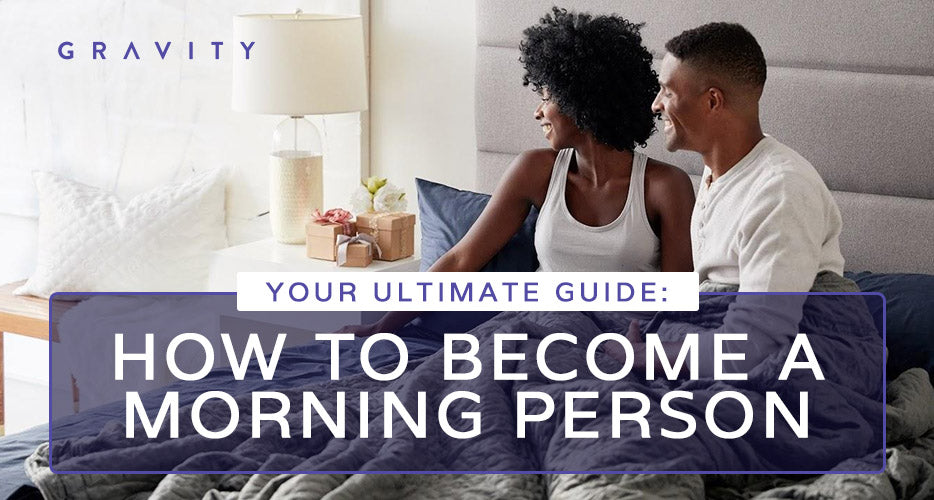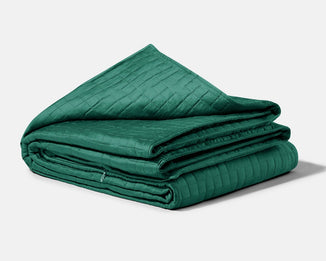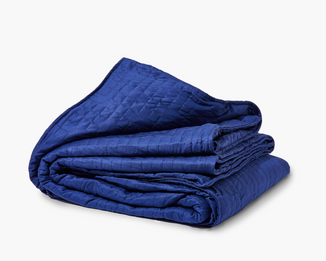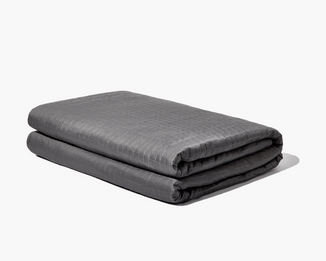
Jul 27, 2021
Your Ultimate Guide: How to Become a Morning Person
“The morning has gold in its mouth.” – Benjamin Franklin
For so-called night owls, hitting the snooze button on the alarm and staying in a comfortable bed is one of life’s simple pleasures. It’s up there with taking a hot shower in the winter, getting cozied up on the couch with a weighted blanket and hitting green lights the whole way home.
But at some point in your life, you may find yourself wanting to become an early riser. Perhaps you’ve heard that morning people tend to be healthier and more successful than their late-night counterparts. Or maybe you need to fix your sleep schedule for a new job, life event or partner.
Whatever the reason, you want to know how to become a morning person so you can get more out of each day. Below, learn more about human sleep patterns and how you can start waking up early without feeling groggy, cranky or tired.
Shop Our Weighted BlanketsWhat Makes Someone a Morning Person or a Night Owl?
Have you ever wondered why so many of us have trouble waking up in the morning, while others practically leap out of their beds to start their day? The answer lies in our individual body clocks — aka, our circadian rhythm.
In humans and other vertebrates, the length of a circadian rhythm is about 24 hours. But some people have slightly shorter or longer natural cycles. If your cycle is shorter, you’re more likely to be an early riser. If your cycle is slightly longer, you’re probably a night owl.
So, can you train yourself to become a morning person? According to scientists, the answer is yes — at least, to a certain extent. About 50 percent of your sleep-wake cycle is predetermined by your DNA, giving you a little bit of wiggle room to adjust your sleep patterns.
In other words, you may never become a true morning lark. But with a few simple changes to your daily routine, you can start waking up earlier in the morning. Getting up even one hour earlier can have a positive impact on your health and well-being!
The Benefits of Being an Early Riser
Becoming a morning lark can be a grueling process. But the truth is, waking up at the crack of dawn comes with a lot of perks. Here are a few benefits of being an early riser:

- Morning People Are Happier – The overly chipper demeanor of morning larks is often the source of many jokes. But as it turns out, their rise-and-shine attitude could be one of the reasons why they’re so happy in the first place. According to researchers from the University of Colorado at Boulder, waking just one hour earlier can cut your depression risk by 23 percent. One theory is that morning people are exposed to more sunlight, which triggers the brain’s release of mood-boosting chemicals such as serotonin.
- Morning People Are Healthier – Sorry, night owls, but nutrition experts say that morning people are more likely to make healthier food choices. In a study published in the journal Obesity, researchers found that night owls were more likely to eat less protein and load up on sugar in the morning, putting them at a higher risk of obesity and metabolic issues in the future. They also found that night owls had poorer sleep patterns and were less active compared to morning larks.
- Morning People Are Safer Drivers – Between dropping the kids off at school and going to work, driving in the early hours of the morning is unavoidable for many people. Unfortunately for night owls, driving in the morning could be a risky endeavor. In a 2014 study from the University of Granada, researchers asked morning and evening people to drive at 8 a.m. Perhaps unsurprisingly, they found that morning people were more alert and made fewer errors than evening people.
- Morning People Are More Likely to Be Successful – Some of the most successful people in the world — including Apple CEO Tim Cook and LinkedIn CEO Jeff Weiner — are up and at ’em by 5:30 a.m. Why? Because waking up early in the morning gives you the rare opportunity to work undisturbed before everyone else burdens you with their problems. Early mornings can also make you more productive by increasing your exposure to sunlight, making you more energized and alert throughout the day.

How to Become a Morning Person
If burning the midnight oil is starting to conflict with your daily responsibilities, don’t worry — you can learn how to become a morning person with a few simple changes. Here are some tips to help you change up your sleeping patterns.
1. Calculate when you should go to bed.
The first step to becoming a morning person is figuring out how much sleep you need to feel alert and well-rested. This number varies from person to person, but according to the sleep experts, most adults need seven to nine hours of shut-eye per night.
Not sure how much sleep you need? Take stock of how you feel the next day after different amounts of sleep. Eventually, you’ll get a good idea of how much sleep your body needs to function properly.
Once you know how many hours of sleep you need, you can set a bedtime that will help you reach that number each night. If you need eight hours of sleep and want to wake up at 5:30 a.m., for example, that means you need to go to bed no later than 9:30 p.m.
2. Make gradual adjustments.
Unless there’s a specific reason (i.e., work or a doctor’s appointment), you don’t need to wake up at the crack of dawn right away. In fact, the easiest way to change your sleep cycle is to do it gradually. Take things slow and steady by gradually scaling back your bedtime in 15-minute increments. For example, if your normal bedtime is 12 a.m., try going to bed at 11:45 p.m. and 11:30 p.m. the next day.
Keep in mind that it’s normal to feel a bit groggy when you get up in the morning. If you’re still feeling tired throughout the day, however, you may need to give your body more time to adjust to your new schedule. Stick to your new bedtime for a few more nights before you attempt to shave off another 15 minutes.

3. Start your day with sunlight.
Light and darkness have a powerful effect on our circadian rhythms, effectively telling us when to be active and when to sleep. To jumpstart your mornings, open the blinds and expose yourself to lots of bright, natural light within an hour of waking up. Exposing yourself to early morning sunlight not only helps you feel more alert during the day, but it can also help you sleep better at night by rebooting your sleep-wake cycle.
For this reason, summer is a great time to become a morning person. But if you need to change up your sleep schedule in the winter, wake-up lights can be helpful. Also known as dawn simulation lights, these useful gadgets are designed to mimic the gradual rising of the sun so you can wake up gradually when it’s still dark out.
4. Block light in the evening.
For similar reasons, you’ll also want to reduce your exposure to bright light in the evening. Blue light in particular has been known to disrupt sleep by suppressing the release of melatonin, which is the hormone that is associated with control of the sleep-wake cycle.
For better quality sleep, close your blinds at least two hours before bedtime and download blue light filters for your electronic devices. If you struggle to fall asleep at night, you can also try wearing a weighted sleep mask to block out light. It’s much easier to fall asleep when you’re surrounded by complete darkness, and the gentle pressure of the mask will help you relax.
Get a Better Night’s Rest with a Weighted Eye Mask5. Prepare the night before.
Night owls are hardwired to be more productive in the evening. So, why not play to your strengths? Make your mornings a little easier by preparing the night before. Pick out your clothes, write down what you need to prioritize that morning and get organized for the next day. The less you have to do in the morning, the more time you have to relax and actually enjoy the calm and quiet.
6. Don’t let your diet ruin your sleep.
Most people know that certain foods can affect their sleep quality and duration (hello, caffeine!). But did you know that when you eat is just as important? In a 2020 review on diet and sleep patterns, researchers found that night owls tend to eat dinner much later than morning larks. Their findings also revealed that evening people were more likely to engage in unhealthy eating habits compared to morning people.
Experts say that eating too close to bedtime — and eating a big dinner, in particular — can disrupt your sleep. If you want to fall asleep earlier, consume your biggest meals earlier in the day and eat a light dinner.
7. Create a soothing bedtime ritual.
Waking up early can be difficult for night dwellers, but arguably, the real challenge is going to bed on time. Many night owls don’t feel sleepy before midnight, so they just end up staring at their bedroom ceiling for hours.
Fortunately, that’s where bedtime rituals can be a huge help. Engaging in relaxing activities before bed — like practicing meditation and reading — can help switch your brain into sleep mode, making it easier for you to fall and stay asleep.
If you’re looking for a fantastic nighttime ritual to help you unwind, consider making our Gravity Weighted Blanket part of your bedtime routine. This weighted comforter uses the power of deep pressure stimulation to relax the nervous system, making you feel calm and sleepy.
8. Establish a wake-up routine.
Having trouble rousing yourself out of bed? We’ve all been there. Even morning people sometimes struggle to resist the temptation of a warm, cozy comforter.
To help kickstart your day, build a wake-up routine that makes you feel happy and more productive. Drink a glass of ice water first thing in the morning to boost your alertness and energy. Set the tone for the day by listening to upbeat music.
Also, don’t forget to make your bed. That way, you’ll be less tempted to dive back into your cozy sheets and ruin all of your hard work.

9. Stick to a schedule.
While it might sound basic, keeping a steady schedule is key to becoming a morning person. If you hit the snooze button too much, you’ll inevitably fall back into your old, night-dwelling ways. (Besides, post-snooze sleep isn’t high-quality. In fact, it will probably just make you feel more tired and groggy.)
Instead, stick to a predictable schedule and try to skip the alarm altogether. If you go to bed at a decent hour, your body should wake up naturally after getting a full night’s rest.
10. Give yourself something to be excited about.
If you’re having a hard time making your new sleep schedule stick, think of small ways to get yourself excited for the morning. Build a morning music playlist, for example, or make yourself a delicious breakfast. Maybe you could watch an episode of a guilty-pleasure Netflix show and make it a rule that you can only watch it in the morning. These small incentives can get you going each day by giving you something fun to look forward to in the morning.
Rise and Shine
If you’re an extreme night owl, don’t expect to become a morning person overnight. It may take some time to revamp your sleep patterns and adjust to your new schedule. Stick with it and reward yourself often. With any luck, you’ll never miss out on a gorgeous sunrise again.
Image Credits:
M.Style/Shutterstock.com
Nenad Aksic/Shutterstock.com
InnerVisionPRO/Shutterstock.com
My Ocean Production/Shutterstock.com
Your use of this website, its content, and any products obtained through this website is at your own risk. This website, its content, and any products obtained through this website are provided on an “as is” basis, without any warranties of any kind, either express or implied, including warranties of merchantability, infringement of intellectual property, or fitness for any particular purposes. No warranty or representation is made with respect to the completeness, reliability, quality, or accuracy of this website or its content. This website, its content, and any products obtained through this website do not constitute medical treatment and is not a substitute for a medical examination or diagnosis. If you are dealing with a health condition check with your health care provider before using. This website may contain affiliate links that allow us to earn a commission on purchases made through such links. We may accept forms of advertising or sponsorships in connection with this website. There might also be paid topic insertions. We may accept and keep free products, services, and other forms of compensation from others.












